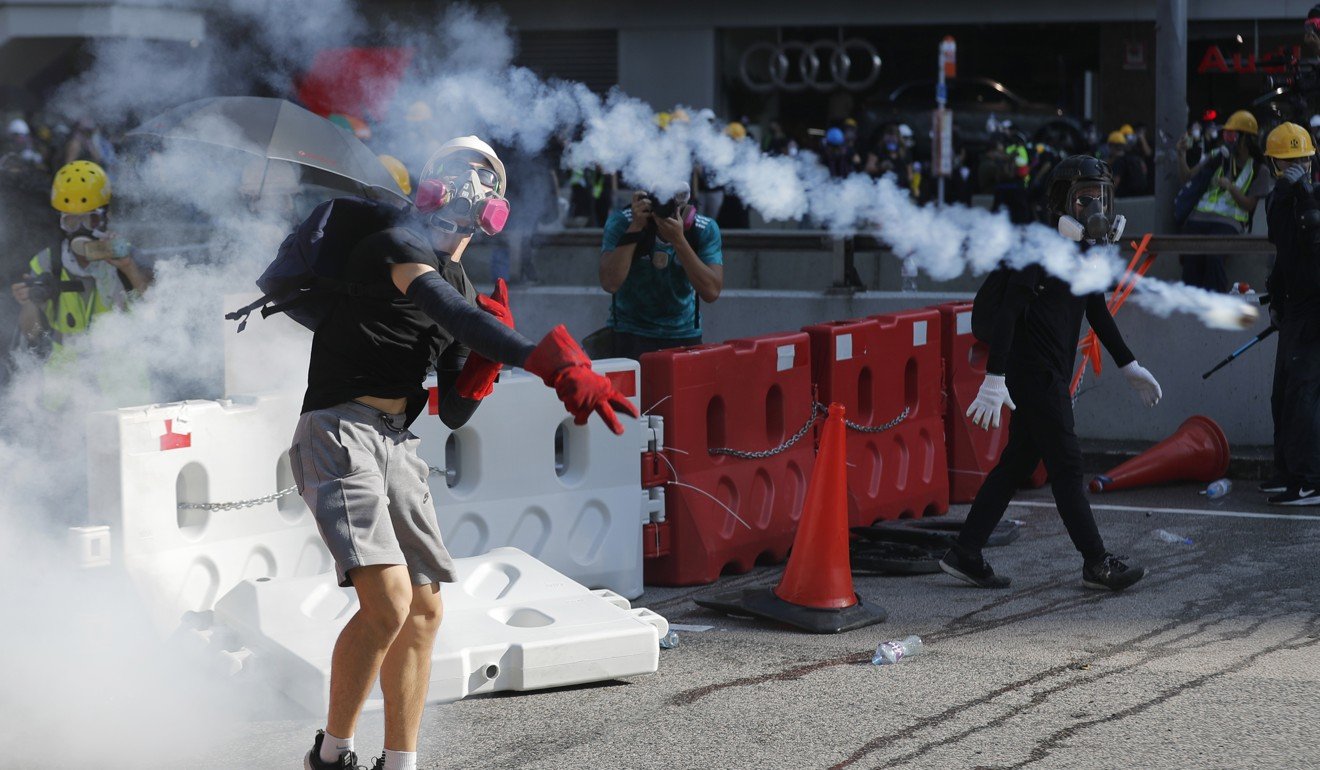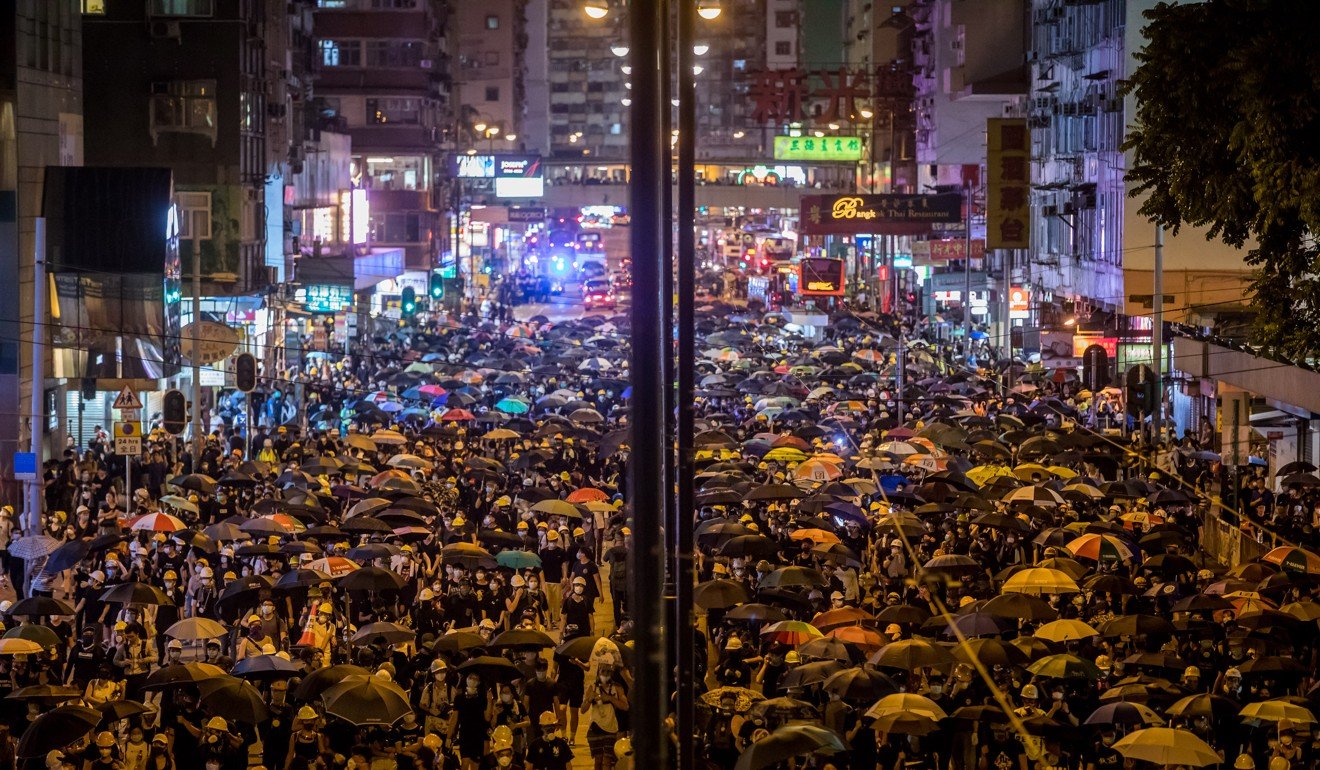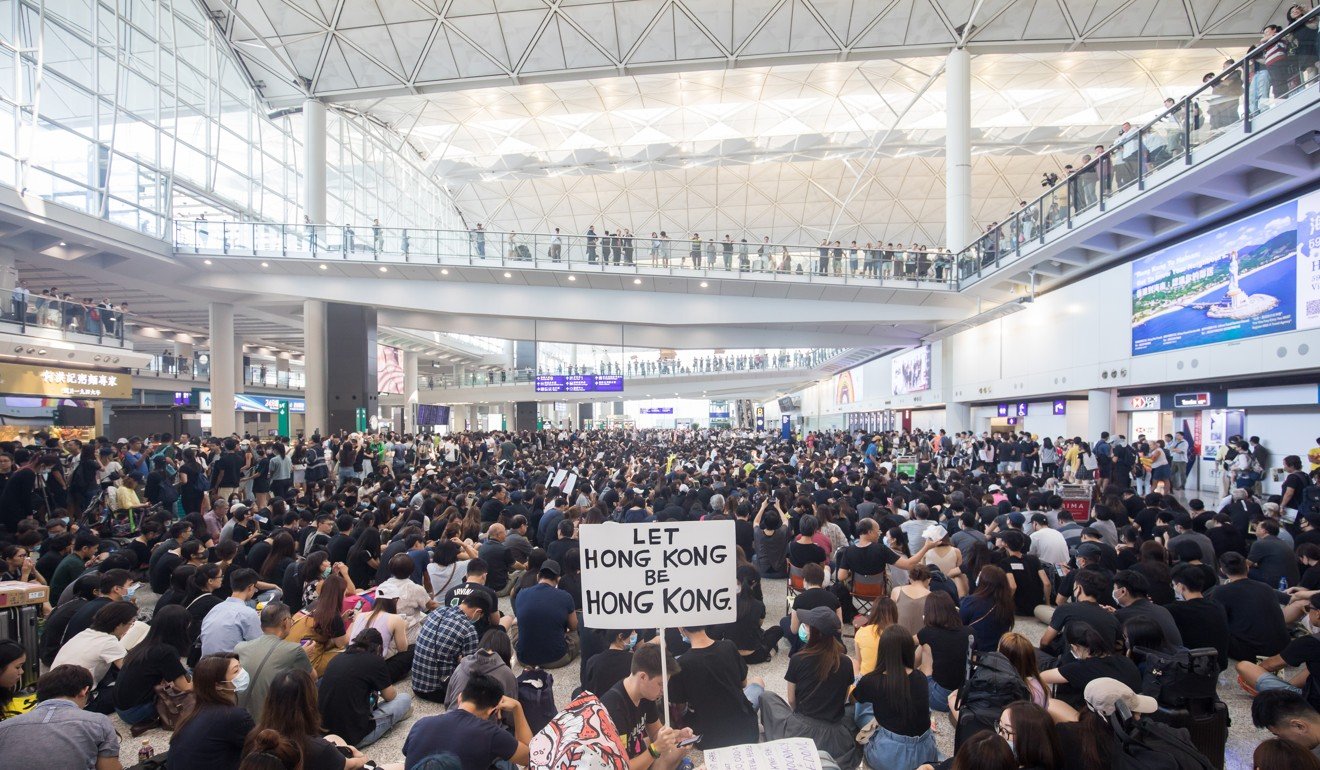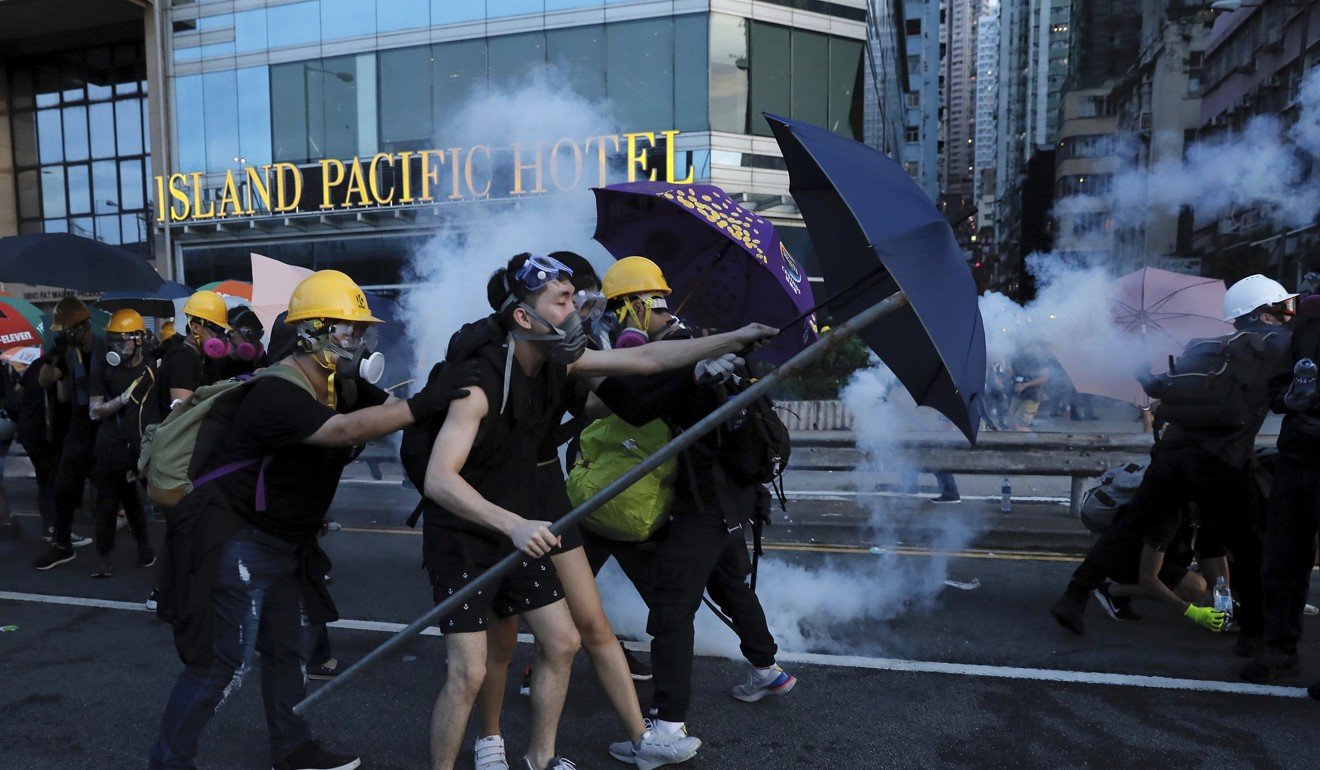- Joined
- Jul 16, 2008
- Messages
- 24,410
- Points
- 113
https://www.scmp.com/week-asia/politics/article/3022253/are-singaporeans-gloating-chaos-caused-hong-kong-protests
Where do Singaporeans stand on the Hong Kong protests? With China or with Hong Kong?

A protester walks through billowing tear gas outside a train station in Wong Tai Sin on August 4, 2019. Photo: Sam Tsang
Are unsympathetic Singaporeans gloating at the ongoing unrest in Hong Kong, viewing protesters as little more than disruptive troublemakers?
Some Hongkongers believe so, pointing to comments they have heard from their Singaporean friends and remarks made on social media.
Hongkonger Joyce Fung, in her 20s, said: “I keep seeing how they label protesters ‘violent rioters’, and say that Hong Kong people should accept the fact that Hong Kong is part of China.”
These Singaporeans are no different than pro-Beijing Hongkongers, said the social science student at Hong Kong University.
Office worker Andrea Mak, in her mid-30s, knows a few Singaporeans who asked why Hong Kong protesters had turned violent.
“Singaporeans think it is wrong, and that you shouldn’t go against your government,” she said. “They say you are pushing it when you attack the police, when you set fire to police stations.”
Both women felt Singaporeans who criticise the protests and protesters do not understand the situation in Hong Kong.
“They do not think we are fighting for freedom or liberty because in their country, they can’t protest,” said Mak.
https://www.scmp.com/week-asia/soci...tests-uygur-camps-how-chinese-students-became
The protests began in June over a controversial government bill to allow the extradition of fugitives to jurisdictions with which Hong Kong has no exchange arrangements, including mainland China.
Even after the bill was shelved, anti-government demonstrations have continued and widened to include young people, civil servants and various professionals.
Frequent clashes with police have intensified, with protesters setting fires outside police stations last Saturday.
These developments have been covered extensively by the Singapore media, which has also reported a decline in Singaporeans booking trips to Hong Kong – a city that many enjoy coming to for eating and shopping. An estimated 15,000 Singaporeans live in Hong Kong and several have also expressed concern about remaining in the city amid reports of violence stemming from the protests.
In recent weeks, police have stepped up their use of tear gas and pepper spray to disperse crowds, while protesters have been hurling bricks and other objects, as well as starting fires.
Singaporeans … cannot understand Hong Kong’s struggle for freedom and democracy - Stephan Ortmann, an academic
Recent reports also say some Hongkongers have begun considering relocating, including to Singapore, and that some wealthy businessmen have begun moving their assets to the city state.
All this has left some Hongkongers thinking that Singapore is capitalising on its situation.
An independent survey in June found Singaporeans largely supportive of the Hong Kong protests, but experts feel they may have changed their opinion since then.
Law professor Eugene Tan of the Singapore Management University suggested that the violence and disruptions of recent weeks may have been the turning point.
Even though Singaporeans sympathised, he said, they did not support actions such as stopping trains and blockading roads.
Tan said Singaporeans were generally conditioned to be averse to civil disobedience, violence and disruptions.

A protester throws back a tear-gas canister during demonstrations in Hong Kong. Photo: AP
Share:
“There is, in Singapore, an emphasis by the government on harmony, which I would argue Singaporeans have internalised to a large extent,” he said.
“They would feel there is a time and place for this protest. But when protesters play a cat-and-mouse game with the police, I think there will be a sense that that is going overboard.”
Singaporeans do not know how it feels - Reuben Wong, an academic
Others felt Singaporeans do not understand Hong Kong’s political situation.
Many Singaporeans do not see protests as a legitimate form of political struggle, said Stephan Ortmann, an assistant professor of comparative politics at City University of Hong Kong.
“These Singaporeans primarily think from a materialist perspective and cannot understand Hong Kong’s struggle for freedom and democracy or against growing encroachment from the mainland,” said Ortmann, who has written about the history of student activism in Hong Kong.
https://www.scmp.com/week-asia/econ...-play-more-hongkongers-consider-migrating-due
Reuben Wong, an associate professor of political science at the National University of Singapore said real differences between the two cities also contribute to the gap in understanding.
Singapore is an independent country, whereas Hong Kong is part of China but operating under the principle of “one country, two systems” that allows it certain freedoms not available on the mainland.
Hongkongers guard their freedoms jealously, while fearing that Beijing might step in and make its presence felt.
“These are issues that Singapore never has to contend with,” Wong said. “We do not have that situation, so Singaporeans do not know how it feels.”

Demonstrators walk on the street during a protest in the North Point district of Hong Kong. Photo: Bloomberg
Share:
He added that unlike Hongkongers, Singaporeans are also “law-and-order people” who have accepted that gaining economic progress means giving up some rights.
Ortmann said Singaporeans were “taught from school that it is best to follow orders”.
“The government has promoted the idea that any opposition or challenge could pose a risk to the very survival of Singapore, and thus must be avoided,” he said.
No surprise then, if Singaporeans appear unsympathetic to Hongkongers.
https://www.scmp.com/week-asia/opin...dnt-fear-pla-even-if-it-us-china-battleground
Asked about this during an interview with This Week in Asia on Wednesday, Singapore’s Minister for Law and Home Affairs K Shanmugam said many Singaporeans, perhaps the majority, believe they are lucky that this kind of unrest was not happening in the city state.
“If this happened to us, it would be bad for our economy and we don’t have the advantages Hong Kong has to weather such a situation,” he said.
“Hong Kong has the huge advantage of China’s support. Singapore has no one to support it.
“From that perspective, I think Singaporeans say if this happens in Singapore, it will be very troublesome and they are grateful that it is not happening here.”
Anecdotal conversations with finance sector professionals in Singapore reveal there have been Hong Kong-based customers cashing out of investments or moving assets out of the city in recent weeks, while wealth management firms This Week in Asiaspoke to reported a rise in inquiries from investors, including those from mainland China and Hong Kong, keen to put funds in Singapore.
Singapore’s central bank cautioned wealth managers against aggressively wooing clients with assets in Hong Kong, reported Singapore daily The Straits Times.
But Song Seng Wun, an economist from CIMB Private Banking, said there was no need to chase after such individuals who know how to look after themselves.
“They do what they need to do without being told,” he said. “In Hong Kong, those who wanted to diversify would have got their accounts in Singapore long ago.”

A demonstrator holds a sign reading “Let Hong Kong be Hong Kong” during a protest at the Hong Kong International Airport. Photo: Bloomberg
Share:
He felt the central bank just wanted to “remind everybody, especially younger bankers, to not go out there and gloat”.
Song said Singapore is well known as a neutral safe haven for investors, and a “beacon during periods of uncertainty”.

Protesters use umbrellas to shield themselves from tear gas fired by policemen as they face off on a streets in Hong Kong. Photo: AP
Share:
Singapore-based Abacus Wealth Management said it had been approached by “a few” Hong Kong family offices in recent weeks.
A private banker at an American bank in Singapore said there were more queries recently from Hong Kong, and added that Singapore’s financial policies, including its tax exemptions, made it attractive for investors.
Song felt that even if there is an inflow of funds from Hong Kong, it may be temporary.
“It’s always the case that during periods of maximum uncertainty, money will go where it has to go as a form of insurance,” he said. “But after that, when things stabilise, the money will go back again.”
https://www.scmp.com/week-asia/politics/article/3022253/are-singaporeans-gloating-chaos-caused-hong-kong-protests
Where do Singaporeans stand on the Hong Kong protests? With China or with Hong Kong?
- Some Hongkongers say that based on what they see on social media, Singaporeans do not understand the situation, and why protesters are fighting for ‘freedom and liberty’
- Reports of Hongkongers relocating to Singapore and moving assets there have fuelled the perception that the Lion City is capitalising on Hong Kong’s situation

A protester walks through billowing tear gas outside a train station in Wong Tai Sin on August 4, 2019. Photo: Sam Tsang
Are unsympathetic Singaporeans gloating at the ongoing unrest in Hong Kong, viewing protesters as little more than disruptive troublemakers?
Some Hongkongers believe so, pointing to comments they have heard from their Singaporean friends and remarks made on social media.
Hongkonger Joyce Fung, in her 20s, said: “I keep seeing how they label protesters ‘violent rioters’, and say that Hong Kong people should accept the fact that Hong Kong is part of China.”
These Singaporeans are no different than pro-Beijing Hongkongers, said the social science student at Hong Kong University.
Office worker Andrea Mak, in her mid-30s, knows a few Singaporeans who asked why Hong Kong protesters had turned violent.
“Singaporeans think it is wrong, and that you shouldn’t go against your government,” she said. “They say you are pushing it when you attack the police, when you set fire to police stations.”
Both women felt Singaporeans who criticise the protests and protesters do not understand the situation in Hong Kong.
“They do not think we are fighting for freedom or liberty because in their country, they can’t protest,” said Mak.
https://www.scmp.com/week-asia/soci...tests-uygur-camps-how-chinese-students-became
The protests began in June over a controversial government bill to allow the extradition of fugitives to jurisdictions with which Hong Kong has no exchange arrangements, including mainland China.
Even after the bill was shelved, anti-government demonstrations have continued and widened to include young people, civil servants and various professionals.
Frequent clashes with police have intensified, with protesters setting fires outside police stations last Saturday.
These developments have been covered extensively by the Singapore media, which has also reported a decline in Singaporeans booking trips to Hong Kong – a city that many enjoy coming to for eating and shopping. An estimated 15,000 Singaporeans live in Hong Kong and several have also expressed concern about remaining in the city amid reports of violence stemming from the protests.
In recent weeks, police have stepped up their use of tear gas and pepper spray to disperse crowds, while protesters have been hurling bricks and other objects, as well as starting fires.
Singaporeans … cannot understand Hong Kong’s struggle for freedom and democracy - Stephan Ortmann, an academic
Recent reports also say some Hongkongers have begun considering relocating, including to Singapore, and that some wealthy businessmen have begun moving their assets to the city state.
All this has left some Hongkongers thinking that Singapore is capitalising on its situation.
An independent survey in June found Singaporeans largely supportive of the Hong Kong protests, but experts feel they may have changed their opinion since then.
Law professor Eugene Tan of the Singapore Management University suggested that the violence and disruptions of recent weeks may have been the turning point.
Even though Singaporeans sympathised, he said, they did not support actions such as stopping trains and blockading roads.
Tan said Singaporeans were generally conditioned to be averse to civil disobedience, violence and disruptions.

A protester throws back a tear-gas canister during demonstrations in Hong Kong. Photo: AP
Share:
“There is, in Singapore, an emphasis by the government on harmony, which I would argue Singaporeans have internalised to a large extent,” he said.
“They would feel there is a time and place for this protest. But when protesters play a cat-and-mouse game with the police, I think there will be a sense that that is going overboard.”
Singaporeans do not know how it feels - Reuben Wong, an academic
Others felt Singaporeans do not understand Hong Kong’s political situation.
Many Singaporeans do not see protests as a legitimate form of political struggle, said Stephan Ortmann, an assistant professor of comparative politics at City University of Hong Kong.
“These Singaporeans primarily think from a materialist perspective and cannot understand Hong Kong’s struggle for freedom and democracy or against growing encroachment from the mainland,” said Ortmann, who has written about the history of student activism in Hong Kong.
https://www.scmp.com/week-asia/econ...-play-more-hongkongers-consider-migrating-due
Reuben Wong, an associate professor of political science at the National University of Singapore said real differences between the two cities also contribute to the gap in understanding.
Singapore is an independent country, whereas Hong Kong is part of China but operating under the principle of “one country, two systems” that allows it certain freedoms not available on the mainland.
Hongkongers guard their freedoms jealously, while fearing that Beijing might step in and make its presence felt.
“These are issues that Singapore never has to contend with,” Wong said. “We do not have that situation, so Singaporeans do not know how it feels.”

Demonstrators walk on the street during a protest in the North Point district of Hong Kong. Photo: Bloomberg
Share:
He added that unlike Hongkongers, Singaporeans are also “law-and-order people” who have accepted that gaining economic progress means giving up some rights.
Ortmann said Singaporeans were “taught from school that it is best to follow orders”.
“The government has promoted the idea that any opposition or challenge could pose a risk to the very survival of Singapore, and thus must be avoided,” he said.
No surprise then, if Singaporeans appear unsympathetic to Hongkongers.
https://www.scmp.com/week-asia/opin...dnt-fear-pla-even-if-it-us-china-battleground
Asked about this during an interview with This Week in Asia on Wednesday, Singapore’s Minister for Law and Home Affairs K Shanmugam said many Singaporeans, perhaps the majority, believe they are lucky that this kind of unrest was not happening in the city state.
“If this happened to us, it would be bad for our economy and we don’t have the advantages Hong Kong has to weather such a situation,” he said.
“Hong Kong has the huge advantage of China’s support. Singapore has no one to support it.
“From that perspective, I think Singaporeans say if this happens in Singapore, it will be very troublesome and they are grateful that it is not happening here.”
Anecdotal conversations with finance sector professionals in Singapore reveal there have been Hong Kong-based customers cashing out of investments or moving assets out of the city in recent weeks, while wealth management firms This Week in Asiaspoke to reported a rise in inquiries from investors, including those from mainland China and Hong Kong, keen to put funds in Singapore.
Singapore’s central bank cautioned wealth managers against aggressively wooing clients with assets in Hong Kong, reported Singapore daily The Straits Times.
But Song Seng Wun, an economist from CIMB Private Banking, said there was no need to chase after such individuals who know how to look after themselves.
“They do what they need to do without being told,” he said. “In Hong Kong, those who wanted to diversify would have got their accounts in Singapore long ago.”

A demonstrator holds a sign reading “Let Hong Kong be Hong Kong” during a protest at the Hong Kong International Airport. Photo: Bloomberg
Share:
He felt the central bank just wanted to “remind everybody, especially younger bankers, to not go out there and gloat”.
Song said Singapore is well known as a neutral safe haven for investors, and a “beacon during periods of uncertainty”.

Protesters use umbrellas to shield themselves from tear gas fired by policemen as they face off on a streets in Hong Kong. Photo: AP
Share:
Singapore-based Abacus Wealth Management said it had been approached by “a few” Hong Kong family offices in recent weeks.
A private banker at an American bank in Singapore said there were more queries recently from Hong Kong, and added that Singapore’s financial policies, including its tax exemptions, made it attractive for investors.
Song felt that even if there is an inflow of funds from Hong Kong, it may be temporary.
“It’s always the case that during periods of maximum uncertainty, money will go where it has to go as a form of insurance,” he said. “But after that, when things stabilise, the money will go back again.”
https://www.scmp.com/week-asia/politics/article/3022253/are-singaporeans-gloating-chaos-caused-hong-kong-protests


 hook, line and sinker.
hook, line and sinker.